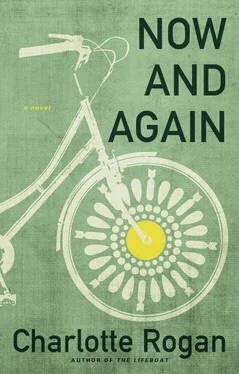Will drove around the loop, slowly at first as he looked for Tula, but then more recklessly when he realized she had probably taken a shortcut across the fields to her house, which was no more than a mile away as the crow flies. He turned the wheel this way and that just to make skid marks in the pristine whiteness. He opened the window and shouted out into the swirling blizzard, “I think I know a little bit about sacrifice, Tula Santos! I joined the army after all!”
The snow absorbed the sound while Will absorbed the strange quiet of the town where he had lived his whole life. As he drove, he gazed at it in wonder, as if he had already left it or returned after an absence of many years. He was as good as gone, and he thrilled to imagine the adventures he would have while the citizens of Red Bud plodded around the same old track. He slammed on the brakes, turning into the skid before speeding up again and letting the thrill overtake him until he was riding the razor’s edge of chaos and control. He marveled at how the plumes of exhaust coming from a car that appeared in front of him turned red in the glow of the car’s taillights, at how the shapes of things seemed sharper and more brittle in the frozen air. He marveled at how things were already changing and would never be the same again. And he marveled at how slowly and inevitably the collision happened when the driver of the car he was following suddenly hit the brakes.
Danny’s girlfriend sent us proof the government not only knew the munitions were toxic, but was taking active steps to cover it up. She sent photographs of damaged babies. She sent some doctored scientific reports.
— Joe Kelly
We got more submissions from soldiers than we knew what to do with. And then it wasn’t just soldiers, it was government contractors and whistleblowers. Concerned citizens, that’s who it was.
— Penn Sinclair
They sent evidence about the war, but also about cancer clusters, toxic waste dumps, government surveillance programs, journalists detained at airports, corporate malfeasance, manipulation of financial markets, politicians bought and paid for. It blew our fucking minds.
— Joe Kelly
SWAT teams breaking up college poker games, moms who lost their kids because of false arrests, first graders handcuffed for talking in class, babies shot in no-knock raids, property seizures without due process, militarization of the police. I would have posted everything on the site, but the captain said we had to remember what the mission was, and the mission was to tell the truth about the war.
— Le Roy Jones
They got their share of hate mail too.
— E’Laine Washington
10.1 Le Roy Jones
Le Roy was alone in the warehouse when a visitor knocked at the door saying he was a reporter and asking to be let in.
“How did you find us?” asked Le Roy.
“A woman named Dolly Jackson sent me here.”
“Hunh,” said Le Roy. “Danny’s girlfriend sent you? How do you know her?”
“A while back I wrote a series of articles on innocent prisoners. One of my sources told me that Dolly was on to an even bigger story, and Dolly told me about you.”
“Hunh,” Le Roy said again.
Three months before, Le Roy would have let anyone in. One day a serviceman who had been summoned to the building across the street installed a new Kenmore refrigerator before Danny returned and pointed out the mistake. Another time, Le Roy enjoyed takeout from a local Chinese restaurant that wasn’t meant for them. After that, Danny helped Le Roy develop a method for sensing when something was about to go off track, and a surefire indicator was that the doorbell would ring when everyone but Le Roy was out of the warehouse.
“Don’t answer the doorbell,” Danny had reminded him just that morning. “If no one else is here, you should just let it ring.”
But the reporter didn’t ring the bell. He clomped up onto the front porch and rapped on the windowpane.
“The door’s not locked,” shouted Le Roy when he heard the rapping. He only heard it because he didn’t have his headphones in his ears. He didn’t have them in because the captain and Kelly had gone off somewhere and Danny had gone somewhere too, which meant he could turn the music up as loud as he wanted as long as the upstairs neighbors didn’t complain. Headphones were a good invention, but they weren’t as good as no headphones, which allowed the surfaces of the building to rattle and become part of the music, which Le Roy thought was not only the way the musicians intended it, but what the music itself wanted.
“Listen to this,” he said to the reporter, who just happened to be carrying a video camera and some recording equipment. “Does this sound better to you or this?” He played two versions of the same song, one recorded in a high-tech studio and one out on a busy street.
“No contest,” said the reporter in a smooth voice.
“Yeah,” said Le Roy. “Fuck that other shit.” He put the live recording on again and amped it up until the windows rattled and the computer speakers buzzed a little. “Even better, am I right?”
“So right,” said the reporter.
“More real,” said Le Roy.
“Exactly what I was going to say.”
“I’m thinking of recording this and then playing the recording so it picks up other sounds and then recording that and playing — you know, keep doing that until I reach a point where it no longer sounds better — if I ever reach that point. That’s what I want to find out.”
“I’ve got a digital recorder,” said the man. “Why don’t we try it now?”
After a while the man reached over to turn down the volume and said that his name was Martin Fitch and that he was investigating how a particular top-secret document had found its way to wartruth.com. “The document is called Countering Misconceptions, and it showed up on your website a couple weeks back.”
“Sure,” said Le Roy. “I can help you with that.” Then he opened the email log he had created to track all of the submissions they had received in the weeks since the site went live. “This column shows who sent it, and this shows what, if anything, we did in terms of authentication. And this is the date when I put it up on the site.” He spent a minute scrolling through the log. “Oh, yeah,” he said. “That’s the one we got in the mail from Dolly Jackson. You know Dolly, right?”
“I do,” said Martin. “She’s the one who sent me here.”
After giving Martin the information he wanted, Le Roy told him a little about how the website had started and how the captain felt responsible for Pig Eye and the others even though it wasn’t his fault.
“Whose fault was it?” asked Martin.
“That’s something I think about too,” said Le Roy. “What if the world is just a giant computer simulation? What if the grand master isn’t God, but a computer geek at his keyboard who just wanted to find out what would happen if we took out Saddam? Maybe he also wants to see what happens if we bomb Iran or North Korea or let the polluters run amok. Or what if he makes half the people warlike or hyper-religious or a combination of the two and the other half, you know, all goody-goody and passive. Or if he gives all of the money to a handful of people and everybody else has shit.”
“Hunh,” said Martin. “Cool.”
Just then E’Laine and the single mother came in with bags of groceries. Le Roy had forgotten E’Laine had come to visit for a few days. He was glad to see her, but the gladness was more like satisfaction, the kind a person felt when problems were solved and blanks filled in. Like if he had been wondering where E’Laine was, now he’d know. “There’s E’Laine!” he said, marking the instant a tiny gap closed up inside him.
Читать дальше












